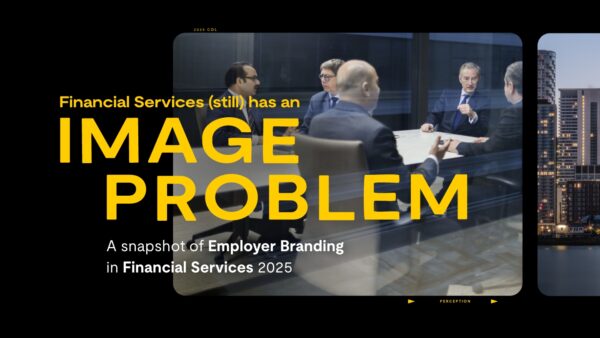Finding your voice when compliance says no
If you work in financial services comms or marketing, you’ve probably experienced the dark side of compliance.
You write something smart, sharp and human. The kind of message that might actually land with your audience. You send it off for review, hoping for the best. But by the time it comes back from compliance, it’s unrecognisable.
The warmth is gone. Any different point of view is gone. In fact, anything that made it feel like it came from a brand with something to say is no longer to be seen.
What’s left is…technically correct. But flat. Forgettable. Safe to the point of invisibility.
It’s understandable. No one wants to cause a scandal. But do we have to sacrifice all distinctiveness the moment a legal lens is applied to content?
In short, no. But it takes a bit more effort – and a shift in how we think about tone of voice in regulated sectors.
The compliance conundrum
In finance, risk management is rightly a top priority. The compliance team isn’t there to ruin your marketing plans – it’s there to protect customers, ensure fair communication, and keep the business on the right side of the rules. We need that.
But something happens when compliance becomes the default gatekeeper for all brand language. It can result in an erosion of voice and perspective. Which can then translate into an erosion of trust.
Because most people won’t believe in faceless financial institutions. And neutral, corporate language doesn’t help.
What people respond to is human warmth. Tone that gives your message a recognisable shape, yet is also confident. This can be the difference between being a ‘company’ and a recognisable brand, especially in a marketplace full of ‘sameness’ (even more so when AI-generated copy is everywhere).
 Our thought leadership website hub for Mizuho
Our thought leadership website hub for Mizuho
Using tone to stand out
When working out how to strike the right balance in your messaging, it’s worth remembering that tone of voice isn’t about being funny or edgy. At its core, tone is about how you sound when you speak – and whether that sound is deliberate, consistent and reflective of who you are.
In other words, a distinctive voice isn’t necessarily about saying different things, it’s about saying things differently. And some of the most successful financial brands have discovered that compliance and personality aren’t mutually exclusive concepts. Rather than viewing regulations as creativity-killers, they treat them as creative parameters to help focus (not flatten) their voice.
There is also a wide range of tones available to choose from even within tight compliance constraints. For example, you can be:
- Warm without being overfamiliar
- Technical without being incomprehensible
- Authoritative without being condescending
- Straightforward without being blunt
- Helpful without overpromising
And there are so many more variants in between to choose from. What you can’t afford to be, though, is generic. Yet that’s precisely the trap that many financial brands fall into when compliance becomes the main ‘editorial filter’.
 Our brand guidelines for Women's Prize Trust
Our brand guidelines for Women's Prize Trust
Assuming everything is off-limits
Believe it or not, though, one of the biggest issues isn’t what compliance restricts. It’s what we assume they will restrict. Often, there’s a kind of pre-emptive self-censorship that kicks in when we’ve been burned a few times.
Because we think it won’t be signed off, it’s tempting to not even try to write with character or originality. We default to passive voice, dense language and abstract phrasing – “due to ongoing macroeconomic headwinds…” – because we think that’s what will pass muster.
But if you sit down with your compliance colleagues and go through the guidelines together, you’ll often find the scope is wider than you thought. They’re usually not saying you can’t have a point of view, just that you can’t make unqualified claims. You can’t give personalised financial advice. You can’t guarantee results.
And that’s fair. It also still leaves a lot of space to be useful, and even engaging. Involving compliance early can also help often avoid the dreaded ‘death-by-edits’ scenario.
Thinking compliance and creativity can’t coexist
Another common pitfall is assuming that being compliant and trusted means boring or ‘same old’. Yet some of the most respected voices in the industry – like Monzo – manage to sound distinctive and compliant.
It’s not because they have less severe compliance teams (as far as we know). It’s because they’ve invested in making tone of voice a strategic asset. Something that’s understood across teams, not just in marketing.
They’ve also built relationships between creative and compliance teams. There’s trust and a shared understanding of risk appetite. There’s also a willingness to problem-solve, rather than play ping-pong with edits.
The goal of everyone working together is not just “how do we get this piece through legal?” but “how do we communicate well, as a regulated brand, to people who need confidence in what we’re saying?”
 We work alongside in-house marketing and compliance teams to help Financial Services brands find their voice.
We work alongside in-house marketing and compliance teams to help Financial Services brands find their voice.
What this looks like in practice
To help enact this, you don’t need to reinvent your entire content strategy. But it can help to be more intentional with the details.
- Swap out jargon for real words
- Use headings that actually say something
- Write like you speak, where you can
- Use examples to make abstract ideas concrete
And if you can’t say something because of regulation, explain that. Transparency builds trust. “We can’t predict the market, but we can help you prepare for different outcomes” is more honest (and more helpful) than silence.
Aim for clear, not safe
What many compliance teams and even comm professionals view as ‘safe’ language is often the most dangerous. It’s unclear. And in finance, being properly understood is everything.
A strong tone of voice doesn’t mean saying risky things. It means saying important things in a way people understand and remember. If you can do that in a way that’s consistent, recognisable, and rooted in your brand’s values, then you’re onto a great thing.
Regulation isn’t going anywhere. But neither is the need for great comms. And trust isn’t built on templated sentences and corporate vagueness. When you’re in asset management, pensions, retail, insurance, commercial, or investing, it’s built on honesty. And a voice that feels unmistakably yours.
Want help cutting through the swamp of compliant messaging? Or making sure AI isn’t making your tone bland and forgettable? At Rationale, we choose exactly the right words, so you don’t have to. Get in touch to find out how we can help you get your personality back.









